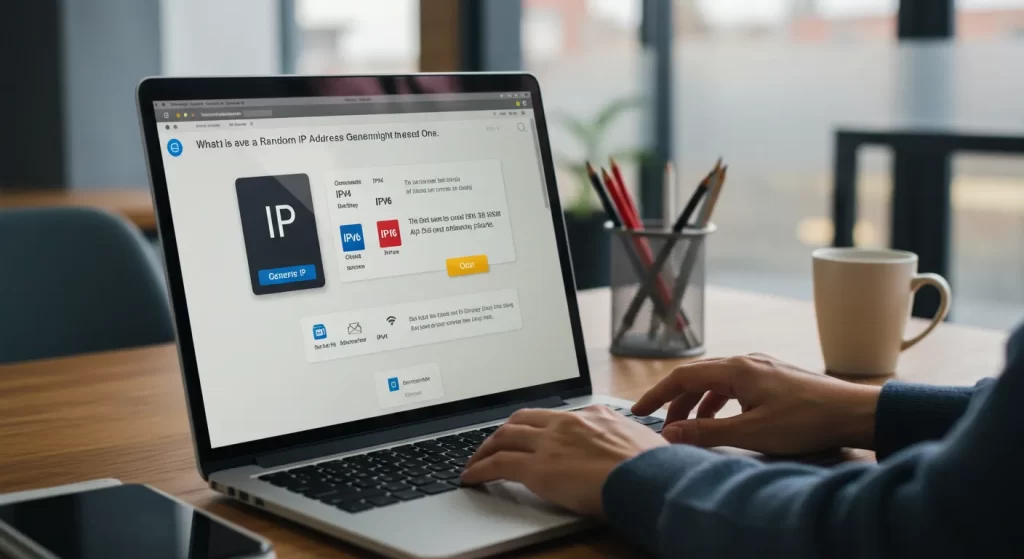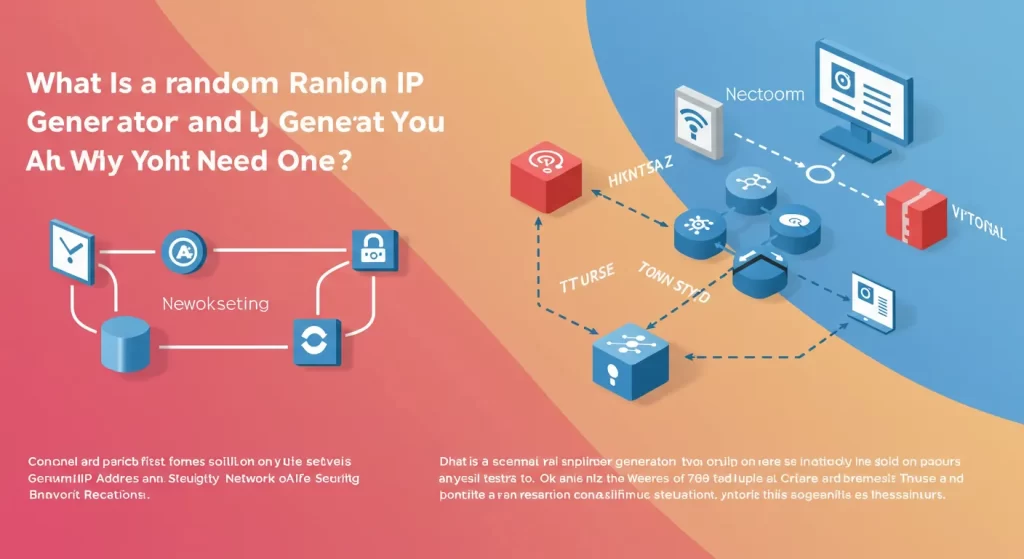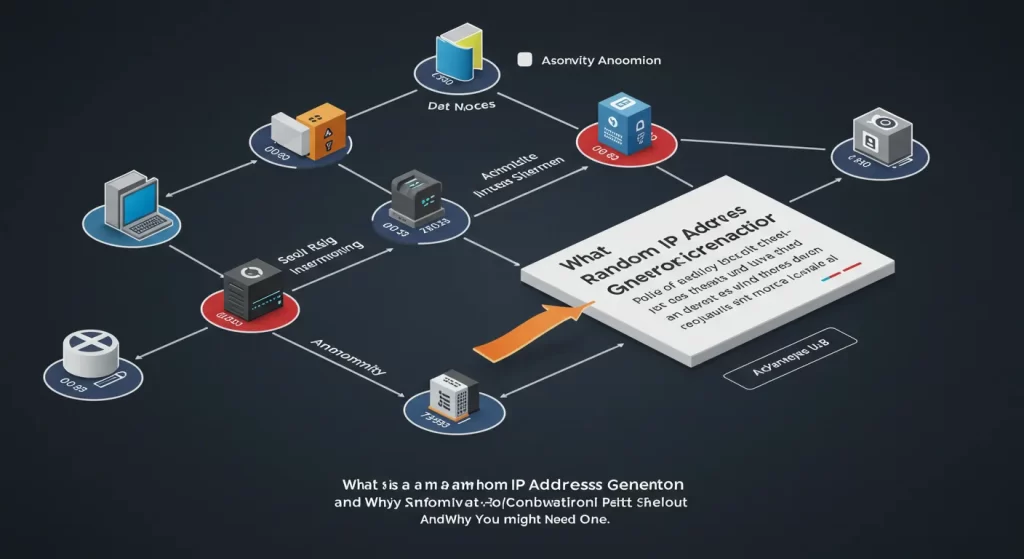Table of Contents
Ever needed a fake but realistic IP address for testing a website or application? That’s where a random IP address generator comes in.
Whether you’re a developer simulating users, a student exploring networks, or just curious, generating random IP addresses can be helpful—but only if you understand how they work and how to use them responsibly.
IP Addresses and Their Importance
Every device connected to the internet has a unique identifier called an IP address. Think of it like a digital home address—it tells other computers where to send information. There are two types: IPv4 and IPv6.
IPv4 is the older version, made up of four sets of numbers from 0 to 255 (like 192.168.0.1). It’s still the most common type in use today. IPv6, however, is much longer and uses both numbers and letters. It’s designed to handle the growing number of devices online.
Why Randomly Generate IP Addresses?

Generating random IP addresses serves many purposes. Developers use them for testing software or mimicking user traffic without needing real user data. Educators use them to help students understand how networks operate. Even cybersecurity teams may need dummy IPs to simulate traffic for training.
But it’s crucial to know that a random IP isn’t always a real, assigned address. Most of the time, they’re just syntactically correct and not connected to any device.
How Devices Communicate Across the Internet
Let’s look at how the internet works to better understand where IP addresses fit in.
When you visit a website, your computer asks, “Where is this site located?” It sends that question to a Domain Name System (DNS) server. DNS translates the name you typed (like google.com) into a numerical IP address. Then, your request travels across a series of routers and servers until it reaches its destination.
Also Read: How Covatza3.9 Software Created: The Journey Behind the Development
Every step of the way, IP addresses are used to guide those data packets to the right place. That’s why even random IP addresses need to be properly formatted—they follow the same system, even if they’re not live.
The Difference Between IPv4 and IPv6
IPv4 has about 4.3 billion possible addresses. It might sound like a lot, but with billions of internet-connected devices, we’ve nearly run out. IPv6 was created to solve this. It can support over 340 undecillion (that’s 36 zeros!) addresses.
IPv6 addresses are longer and use hexadecimal numbers (like 2001:0db8:85a3:0000:0000:8a2e:0370:7334). Generating random IPv6 addresses is more complex, but tools exist to make it easier. More Click Here: IP Website or Application
Generating Random IPs with Code
If you’re a coder, creating random IP addresses is straightforward. For IPv4, here’s how you could do it using Python:
pythonCopyEditimport random
def generate_random_ipv4():
return “.”.join(str(random.randint(0, 255)) for _ in range(4))
print(generate_random_ipv4())
This creates a new random IPv4 address every time it runs. But remember: just because it looks real doesn’t mean it’s in use.
Key Protocols That Make the Internet Work

The seamless flow of information across the internet depends on a suite of protocols. The most foundational are TCP/IP. The Internet Protocol (IP) handles addressing and routing, while the Transmission Control Protocol (TCP) ensures reliable delivery. Other important protocols include HTTP/HTTPS for web browsing, FTP for file transfers, and SMTP for email.
Each protocol plays a specific role in ensuring that data reaches its destination securely and efficiently.
The Physical and Logical Layers of the Internet
Beneath the surface, the internet’s infrastructure is both physical and logical. Physical components include cables, routers, switches, cell towers, and data centers. These elements form the backbone that carries data across continents and oceans.
On the logical side, IP addresses, domain names, and protocols create a standardized system that allows devices and applications to communicate seamlessly. Internet Service Providers (ISPs) and Internet Exchange Points (IXPs) further facilitate the exchange and routing of data.
Practical Applications of Random IP Address Generators
Random IP address generators are more than just technical curiosities. They are essential tools in software development, cybersecurity, and education. Developers use them to populate databases with test data, simulate network traffic, and validate software behavior under different conditions.
In cybersecurity, random IPs help in stress-testing firewalls and intrusion detection systems. Educators use them to demonstrate how networks operate without risking exposure to real-world threats.
Staying Safe and Responsible Online
With great power comes great responsibility. While generating random IP addresses is a harmless and useful activity in controlled environments, it’s important to remember the boundaries. Never attempt to use random IPs to access or disrupt real systems. Always prioritize ethical behavior and respect the privacy and security of others.
Also Read: Welcome to aliensync socials software: The Cosmic Nexus of Technology and Digital Innovation
Changing Your Own IP Address Isn’t That Simple
You can’t just use a random IP address on your own computer to become invisible or hide your identity. Your public IP is assigned by your Internet Service Provider (ISP). If you want to change it, you have a few options:
You could restart your router, which sometimes gives you a new IP. You can ask your ISP for a new one. Or you can use a VPN or proxy server, which hides your real IP behind another one.
However, these options don’t involve generating a truly random IP—they work within structured, authorized networks.
Use Random IP Addresses Ethically
If you’re thinking about generating IPs to see which ones are live or trying to access unknown servers, stop. That’s not just unethical—it can be illegal. Randomly scanning the internet can trigger alerts from network admins and lead to legal action. Stick to safe, responsible use like testing software or teaching.
Helpful Tools and Online Generators

If you’re not into coding, plenty of websites offer random IP address generators. Just search for one, and you’ll find tools that produce both IPv4 and IPv6 addresses with a click. Some even let you set specific rules or exclude private ranges.
Make sure you choose a reliable tool, preferably one that’s transparent about how it works. You don’t want to end up with IPs that conflict with real-world addresses or networks.
When You Should Avoid Random IP Use
While are great for testing, they shouldn’t be used in live applications, production environments, or any situation where data integrity is crucial. If your system mistakenly treats a dummy IP as real, it can cause confusion or even downtime. Use random IPs only in safe, isolated environments, like staging servers or local testing labs.
How the Internet Holds It All Together
Behind every website visit is a complex web of infrastructure. Routers, switches, undersea cables, data centers—all of them work together using IP addresses to connect users around the world.
Protocols like TCP/IP, DNS, HTTP, and HTTPS ensure everything runs smoothly. These rules make sure your request to see a web page actually gets there and comes back safely.
Final Thoughts
A random IP address generator is a valuable tool for developers, testers, and educators. It lets you simulate internet activity without risking real-world consequences. Whether you’re working with IPv4 or IPv6, knowing how these addresses function and how the internet routes them is key to using them responsibly.
Just remember: generating IPs should always be ethical, and they should never be used to interfere with live systems. Keep your usage smart, secure, and safe—and let the internet do what it does best: connect people across the globe.
FAQs
What is a random IP address generator used for?
A random IP address generator is used to create dummy IP addresses for testing, development, or educational purposes.
Can I use a random IP address to change my public IP?
No, your public IP is assigned by your ISP. You can use a VPN or proxy to change it.
Is it legal to scan random IP addresses on the internet?
No, scanning random IPs to access devices is unethical and illegal in many cases, leading to legal consequences.

